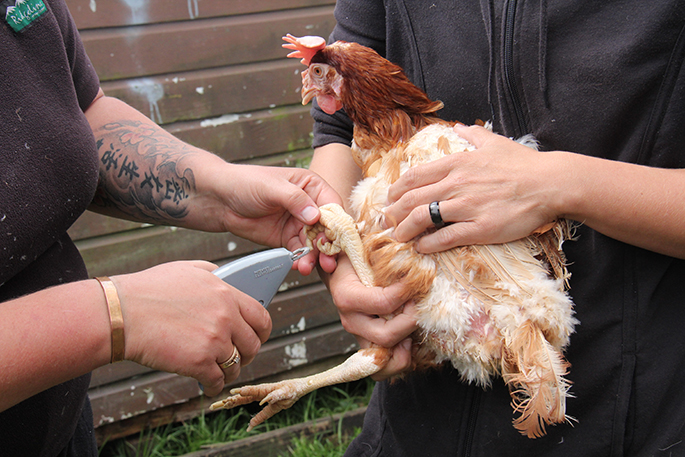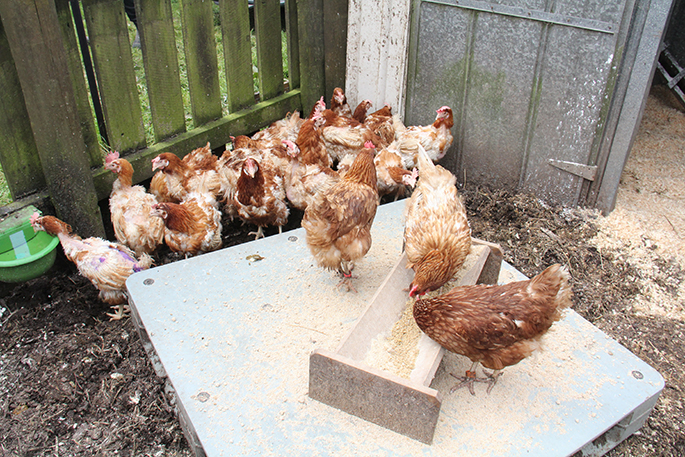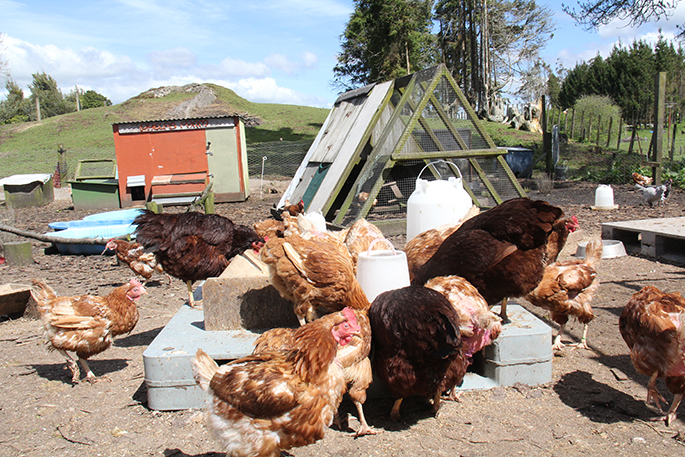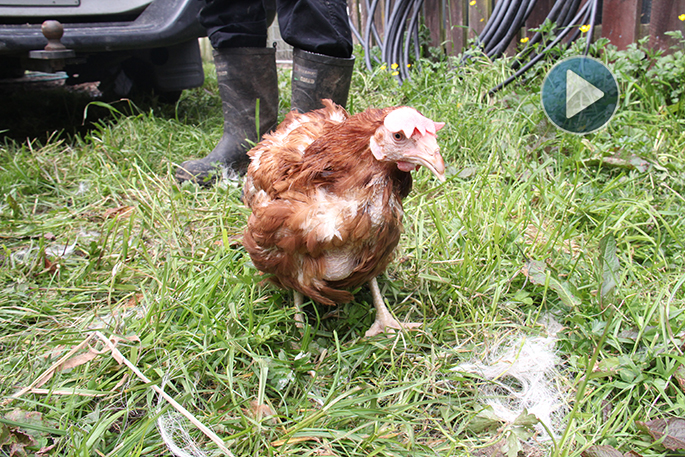I saw it come up on Facebook.
'We're doing a run this Friday, meet me at Oropi Fruit and Veggie at 9am to adopt your hen.” Posted by ‘Free as a Bird Battery Hen and Poultry Rescue'.
I was just getting ready to make my secret Golden Christmas Pavlova recipe and needed eggs. What better than to have freshly laid eggs! I read further. Why were hens available for adoption? Where were they from? Why did they need rescuing?
I rang up and that's when my egg consumption life changed.
Kelly and Blair Phelps have been rescuing and rehabilitating hens from battery farms for the last two years. They've now rehomed over 8000 hens.
'We started out with 20 hens, to see if we could rehabilitate them,” says Kelly. 'That was two years ago. Now I'm rehabilitating 100 hens a week.”
Why do they need rehabilitating? I arranged to meet her on her return from her latest hen rescue. She has just picked up 100 hens from the 47,000 at a local battery farm. One hundred lucky hens.
 Health check.
Health check.
Apparently from the road, the farms look like orchards, a few bee hives scattered around under large leafy trees.
In one shed alone are 15,000 hens. They are there for laying purposes only.
Of the 3.2 million egg-laying chickens in New Zealand, 82 per cent are caged. Each standard battery hen has a floor space smaller than an A4 piece of paper.
Kelly seems to have struck up a good rapport with the owners. They phone her and arrange a pick up day.
'Some farms have moved to colony caging and changed their name from battery to colony to make it seem better,” she says.
'The colony cages are three times longer than the battery cage, but the same height and width. Instead of having six hens per cage, they are now longer and so have 8-10 hens per cage.
'A battery hen lays eggs every day for up to about 18 months,” says Kelly.
'Then they start to moult and stop laying. At this point they become uneconomic to the farm. So they have killing day where all the hens have an electric prod jammed down their throats, to electrocute and stop the heart.
"If they don't die, then they get their heads twisted. Into a wheelie bin, on to a conveyor belt and up into the back of a truck. Then they're turned into blood and bone or meat meal.
'They are not always dead when they get on the truck,” says Kelly.
I'm stunned. I follow her ute, with 100 hens under the tarp, back to Phelps Farm near Ngongotaha.
 Huddled in a corner while three hens show the newbies how to eat and drink.
Huddled in a corner while three hens show the newbies how to eat and drink.
Back at the farm Kelly and her helpers lift out each hen one by one. It's time for a health check. Some are a little stressed, others dazed, but all with their combs lying pale and flopped over. It's the first time they've been in sunlight.
The first time they've touched grass. Each hen is given worm and mite treatment and their nails and beaks trimmed where needed.
Kelly places a hen on the ground in the rehab pen. It doesn't move, just sits there.
'They are in our pen for 3-4 days depending on how quick they can rehab.
'I put about three or four hens in with them who know what to do, to show the new ones how to feed.
'Tonight I need to go out there and put them all to bed. Tomorrow is another day so we will be teaching them how to come out to find food and water, how to perch, how to find bed again, how to shelter.”
This process takes about three days. Once Kelly is comfortable the new hens can go in and out, eat and drink on their own, she moves them out into the farm yard and within about a week they're ready to be adopted out.
I watch as the combs redden up and rise to the sun. It takes less than an hour. The hen on the ground still hasn't moved. She's picked up and placed into the coop. I wander around the farm yard, where there seem to be ducks and geese also roaming freely. In the paddock next door is a donkey braying.
Kelly uses social media and Trademe to find new owners.
 Phelps Farm.
Phelps Farm.
'We screen people a little. Most people are genuine, they want to give a battery hen a good life. These girls are not quite laying yet, but with sunshine and good food, it will take them about 6-8 weeks before they are laying again.”
Kelly meets the new owners at her stops around Tauranga, Kawerau, Matamata, and wherever people write to her from. They later send in photos of their adopted hen and she uploads it to her Facebook page.
The $15 she charges per hen goes towards helping cover the cost of food, bark and petrol. They buy new bark and re-lay the paddock every two weeks.
'We always need more of everything. We are installing a watering system at the moment, and constantly need bark to relay in the paddock.”
She also needs another rehab unit, and chicken mesh and hutches.
'We go through three tonne of food a month. Donations of feed is good but we buy high protein food that these girls need.”
All the cost over runs are covered personally by Blair and Kelly, and people who make donations.
It's an intense afternoon, first the rescue, then high-tailing it back to the farm, about an hour away. The new hens are now huddled together in a corner of their pen, completely still.
Eventually one stretches its featherless neck out towards the water bowl and takes its first step.
I go home and think about all the food items that contain eggs. Cakes, biscuits, and of course my pavlova.
Rosalie's Secret Golden Christmas Pavlova recipe
Adopt 3 hens. Name them. Buy a heavy duty cake mixer. Collect 6 eggs over 2 days from Sally, Sasha and Rumbletummy. Praise them up. Preheat oven to 180.
Remove yolks, beat egg whites til thick and puffy.
Add 3/4 cup sugar, beat until no sugar granules left but is all dissolved into the egg white.
Add 1 tablespoon of cold water, 1 tablespoon of white vinegar, 1 teaspoon of vanilla essence. Mix. Fold in 2 tablespoons of custard powder and 1 tablespoon of cornflour.
Turn out onto baking tray.
Place in oven.
Turn oven off after four minutes and leave for an hour.
When cooled cover with whipped cream and a topping (eg. Kiwifruit, blueberries, strawberries).
The custard powder makes the inside of the pav turn gold.



4 comments
Free range
Posted on 15-12-2016 11:30 | By HallowesHell
is the best, Better for the hens and makes the eggs taste better.
Battery farming
Posted on 15-12-2016 12:10 | By manbearpig
is so clucked up man
Pathetic
Posted on 15-12-2016 13:18 | By overit
I have 2 hens at home, love them to bits. Each has a personality and lays. I sell a dozen eggs a fortnight. There is no need for caged hens in NZ we have so much land. I hope these hens get a better chance at life with their new owners. We eat free range chicken and pork too.
Disgusting
Posted on 15-12-2016 15:07 | By Sprocket
Caging hens for their eggs really ruffles my feathers. Hopefully this free-range initaitive is beakoning in a new era.
Leave a Comment
You must be logged in to make a comment.